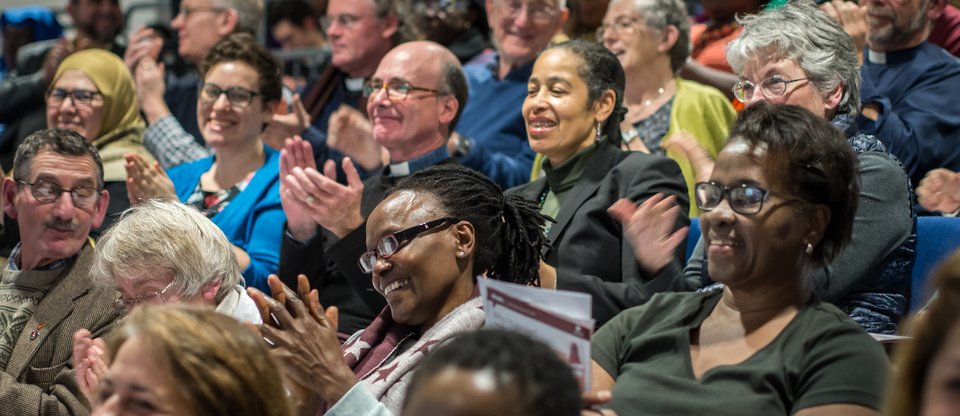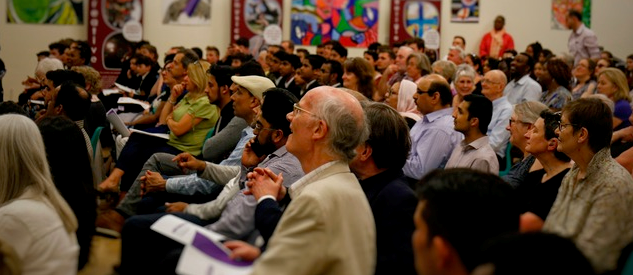Community Organising: Why we evaluate
Community Organising: Why we evaluate

This blog came out of a learning session with the South London Citizens Team.
If you have been to a Citizens UK action or meeting, the chances are you have been part of a particular community organising ritual: the evaluation.
People gather in the corner of a church hall (or stay behind at the end of a zoom call) to ‘evaluate’ the meeting. Usually run by a professional community organiser or experienced community leader, the evaluation will run through the key elements of the meeting.
If you’re an experienced evaluator you might have some questions at this point.
- What learning are we aiming at?
- What is the evaluation framework?
- Who is taking notes?
- How will this be shared with participants?
These questions are all legitimate, and yet miss the point of the evaluations – they are often sites of profound learning but this is not their primary function.
Evaluations in community organising are primarily about relationships and are a fundamental part of forming a relational culture. The most important source of power we have in community organising is the relationships and commitment of voluntary community leaders. As such, our priority should always be to understand where their thinking is at.
Start with feelings
Just as a rounds question opens a meeting up (where everyone is asked the same question to begin), evaluations provide a ritual to close meetings down. Evaluations traditionally start with ‘feelings’. If everyone is feeling ‘upset’, ‘frustrated’ or ‘hopeless’, a very different set of intervention is needed than if everyone is feeling ‘powerful’, ‘motivated’ and ‘excited’. Indeed, the failure to run a good evaluation in the former context could lead to the breakdown of the organisation.
It is often tempting for the evaluation to jump into an analysis of the business of the meeting but good evaluations should refocus us on what really matters: each other - bringing us back to the appreciation of how extraordinary it is to have ordinary people organising together, side by side, and recommitting ourselves to the relationships we have forged and the collective fights we part of.
Build the power of your team
Evaluations also serve to strengthen the team. An evaluation provides the opportunity to collectively reflect on the meeting to make sure everyone has the same understanding and are able to recognise and celebrate each other. In my experience, it is in these moments that I’ve seen collections of individuals become teams; seeing how their role feeds into the whole and lifting each other up.
This also provides a space to collectively agree on next steps, enhancing the sense that we are a team acting and journeying together, rather than a disparate group that has turned up for one event.
Learn together
The person leading the evaluation will often draw out key moments of dynamics to teach the universals of community organising. ‘Did you see how the Mayor responded to being held accountable?’ ‘Why did that story change the energy in the room so much?’ ‘What was the impact of us going 10 minutes over time?’ ‘Are we more powerful than we were before the action? How so?’
In moments like these, we often see the theoretical teaching of community organising becomes real and our collective decisions can be collectively and honestly assessed. This is only possible in a context of trust, vulnerability and relationship. For larger actions, there is often a meeting scheduled a week or so later with the core team of leaders to delve deeper into these questions.
For evaluations to work, it is important to treat them with care as a crucial part of the meeting or action, not a tick-box exercise that is tacked on to the end without much thought. We evaluate because we prioritise our people, their learning and their time.
Getting into a habit of relational evaluations will enable us to build a relational culture, strengthen the team and conduct an honest collective assessment of our meeting/action and strategy - all of these are essential if we want to build power and win change.
How to do an evaluation - a 10-point plan
Evaluations should be a habit that is part of every meeting or action. This might be as simple as how do you feel? What worked well and what could have been better? What are the next steps?
For larger actions, here is a 10 point template that can be useful as a starting point
- Plan time in the agenda to evaluate and prepare someone to lead the evaluation in advance
- Start with feelings (usually in one word so we don’t jump into analysis). Draw out a couple of the feelings and ask people to explain. This is crucial to know where our people are at to frame the rest of the evaluation.
- Ask how the logistics (these are a key part of why people might have felt excluded or disrespected - for example if the venue wasn’t accessible)
- Ask about turnout (90% of the action is turnout! Did we have the people in the room that we needed?)
- Ask about the reaction (did we get the reaction we wanted from this action? Why or why not?)
- Teach: what is the core political lesson of the action?
- Recognise: lift up people who did particularly well - especially people who developed or did something for the first time
- Ask how the action has impacted our power? Are we more powerful? If so, how?
- Agree next steps: Develop a collective understanding of where we are going next
- Grade the action: From A* - F: this enables you to make sure everyone is on the same page and an opportunity to do some final teaching (e.g if the action didn’t go well but everyone gives in an A)

Want to get involved? Find your local Citizens UK chapter by following the link below.




